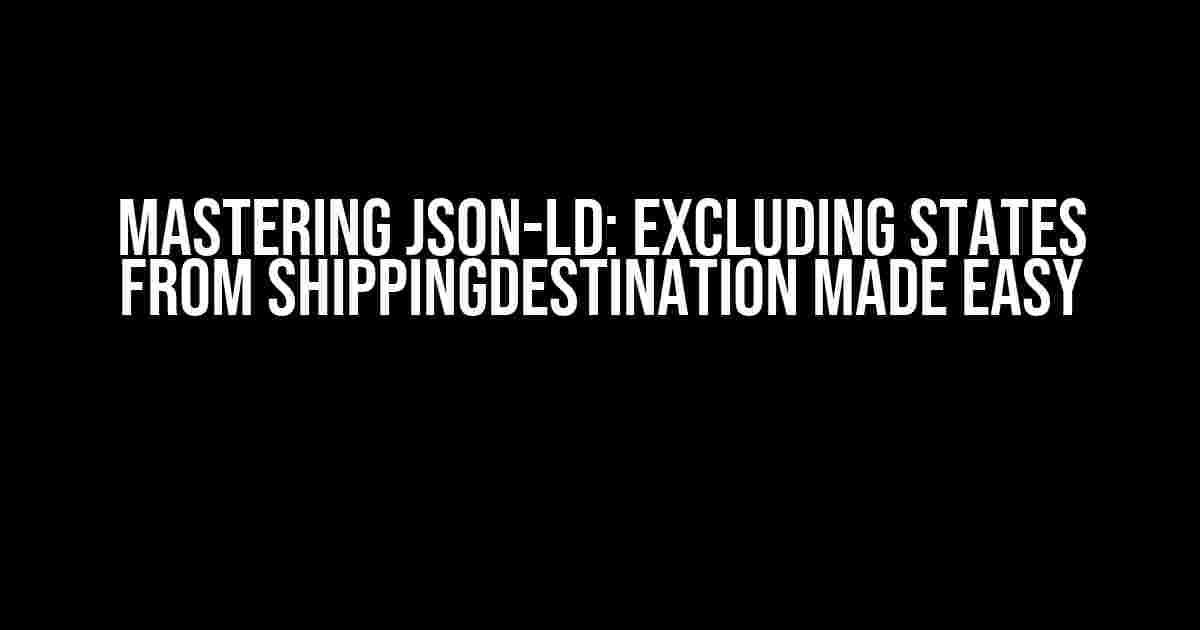Are you struggling to define JSON-LD shippingDetails correctly, particularly when it comes to excluding a list of states from your shippingDestination? You’re not alone! In this comprehensive guide, we’ll dive into the world of JSON-LD and provide you with clear, step-by-step instructions on how to master this crucial aspect of structured data.
What is JSON-LD, and Why Do I Need It?
JSON-LD (JavaScript Object Notation for Linked Data) is a lightweight Linked Data format used to add context to your website’s data. This context helps search engines like Google understand the structure and meaning of your content, improving your website’s visibility and search engine ranking.
In the context of e-commerce, JSON-LD plays a vital role in providing essential information about your products, including shipping details. Accurate shippingDetails, including shippingDestination, can significantly impact the customer experience and, ultimately, your bottom line.
The Importance of Excluding States from shippingDestination
Sometimes, you may need to exclude certain states or regions from your shippingDestination due to various reasons, such as:
- Logistical constraints
- Legal restrictions
- Business strategy
Failing to exclude these states can lead to frustrated customers, unnecessary shipping costs, and a negative impact on your brand reputation.
Step-by-Step Guide to Defining JSON-LD shippingDetails -> shippingDestination
Now that we’ve established the importance of excluding states from shippingDestination, let’s dive into the technical aspects of defining JSON-LD shippingDetails correctly.
1. Basic JSON-LD Structure
<script type="application/ld+json">
{
"@context": "https://schema.org/",
"@type": "Product",
"name": "Product Name",
"image": "Product Image URL",
"description": "Product Description",
"offers": {
"@type": "Offer",
"priceCurrency": "USD",
"price": "10.00",
"shippingDetails": {
"@type": "ShippingDetails",
"shippingDestination": {
"@type": "DefinedRegion"
}
}
}
}
</script>
In the above code, we’ve set up the basic JSON-LD structure for a product, including the offers section, which contains the shippingDetails.
2. Defining shippingDestination
To exclude a list of states from shippingDestination, we need to define the allowed regions using the DefinedRegion type.
<script type="application/ld+json">
{
"@context": "https://schema.org/",
"@type": "Product",
"name": "Product Name",
"image": "Product Image URL",
"description": "Product Description",
"offers": {
"@type": "Offer",
"priceCurrency": "USD",
"price": "10.00",
"shippingDetails": {
"@type": "ShippingDetails",
"shippingDestination": {
"@type": "DefinedRegion",
"addressCountry": "USA",
"exclusiveRegion": [
"Alabama",
"Alaska",
"American Samoa",
...
]
}
}
}
}
</script>
In this example, we’ve defined the shippingDestination as a DefinedRegion, specifying the addressCountry as “USA”. The exclusiveRegion property is an array that contains the states we want to exclude from shipping.
3. Excluding States Using NOT operator
Alternatively, you can use the NOT operator to exclude states from shippingDestination.
<script type="application/ld+json">
{
"@context": "https://schema.org/",
"@type": "Product",
"name": "Product Name",
"image": "Product Image URL",
"description": "Product Description",
"offers": {
"@type": "Offer",
"priceCurrency": "USD",
"price": "10.00",
"shippingDetails": {
"@type": "ShippingDetails",
"shippingDestination": {
"@type": "DefinedRegion",
"addressCountry": "USA",
"excluding": {
"@type": "DefinedRegion",
"addressRegion": [
"Alabama",
"Alaska",
"American Samoa",
...
]
}
}
}
}
}
</script>
In this example, we’ve used the NOT operator by defining an excluding property within the shippingDestination. This property specifies the states we want to exclude using the addressRegion property.
Troubleshooting Common Issues
When defining JSON-LD shippingDetails -> shippingDestination, you may encounter some common issues. Let’s troubleshoot them together:
1. Inconsistent State Abbreviations
Make sure to use the standard two-letter state abbreviations (e.g., “CA” for California) to avoid any inconsistencies.
2. Missing or Incorrect addressCountry
Double-check that you’ve specified the correct addressCountry (e.g., “USA” for United States) to avoid any errors.
3. Incorrect DefinedRegion Type
Ensure that you’re using the correct type for the shippingDestination, which is DefinedRegion.
Best Practices for JSON-LD shippingDetails
To ensure your JSON-LD shippingDetails are accurate and effective, follow these best practices:
- Use standard state abbreviations and country codes.
- Define shippingDestination as a DefinedRegion.
- Use the exclusiveRegion or excluding properties to specify states or regions to exclude.
- Test your JSON-LD code using tools like Google’s Rich Results Test or Bing’s Markup Validator.
- Keep your JSON-LD code up-to-date and consistent across your website.
By following these instructions and best practices, you’ll be well on your way to accurately defining JSON-LD shippingDetails -> shippingDestination and excluding states with confidence.
| State Abbreviation | State Name |
|---|---|
| AL | Alabama |
| AK | Alaska |
| AS | American Samoa |
Remember to replace the states in the table with the ones you want to exclude from your shippingDestination.
Conclusion
In conclusion, defining JSON-LD shippingDetails -> shippingDestination correctly, including excluding states, is crucial for providing an excellent customer experience and improving your website’s search engine ranking. By following the step-by-step guide and best practices outlined in this article, you’ll be able to master this important aspect of structured data and take your e-commerce business to the next level.
If you have any further questions or need help with implementing JSON-LD on your website, feel free to ask in the comments below!
Frequently Asked Question
Get the scoop on defining JSON-LD shippingDetails to exclude specific states – we’ve got the answers!
What’s the purpose of defining shippingDestination in JSON-LD?
Defining shippingDestination in JSON-LD allows you to specify the geographic regions eligible for shipping. This is especially useful when you want to exclude certain states or areas from your shipping policy.
How do I format the shippingDestination property in JSON-LD?
The shippingDestination property should be formatted as an array of strings, with each string representing a geographic region. For example, [“US-AL”, “US-AK”, …] represents Alabama and Alaska, respectively.
Can I use wildcards or regex to exclude multiple states at once?
No, JSON-LD doesn’t support wildcards or regex patterns in the shippingDestination property. You need to explicitly list the excluded states using their ISO 3166-2 codes (e.g., “US-CA” for California).
How do I exclude a list of states from shipping using JSON-LD?
To exclude a list of states, simply omit them from the shippingDestination array. For example, if you want to exclude California, Nevada, and Arizona, your JSON-LD code would look like this: “shippingDestination”: [“US-AL”, “US-AK”, …, “US-WY”] (including all states except the excluded ones).
Are there any tools or resources available to help me generate JSON-LD code for shippingDetails?
Yes, there are several tools and resources available to help you generate JSON-LD code for shippingDetails, such as Google’s Rich Results tool, Schema.org’s documentation, and online JSON-LD generators. These resources can save you time and ensure your code is correct and up-to-date.


